Startups developing AI for neuroimaging, pure steam drying, a solution to transform 3D geodata into useful information, sustainable chemicals, and a novel neurofeedback approach each win CHF 10,000
29.09.2021
AI Medical, AquAero, Archimethod, Biosimo, and MindMetrix win Venture Kick's first stage of financial and entrepreneurial support. Their projects develop intuitive, powerful, and easy-to-use diagnostic software solutions adapted for neuroradiologists, a drying technology able to reduce energy consumption by up to 70% and to eliminate the CO2 emissions almost completely while maintaining high product quality and productivity, digital technologies to transform high-resolution 3D geodata into useful information for different actors in the construction sector, an innovative heterogeneous catalyst that enables the oxidation of ethanol inflow without the formation of CO2, and connect neurophysiology, virtual reality, and mental resilience training.
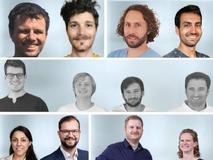 |
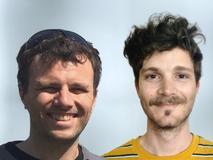 AI Medical founder Christian Federau and Software Engineer Silvio Paganucci
|
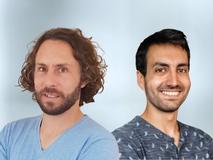 AquAero CEO Christoph Mueller and CTO Thomas Manyoky
|
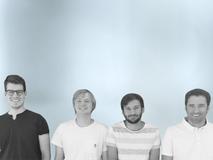 Archimethod Team
|
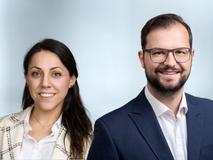 Biosimo Founder Sotiria Mostrou and Co-founder Maximilian Moser
|
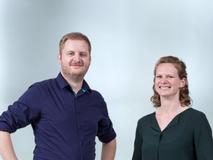 MindMetrix Founders CEO Marc Baechinger and CTO Sarah Meissner
|
AI Medical: Artificial Intelligence for Neuroimaging
AquAero: Pure Steam Drying
Today, in industrialized countries, up to 25 % of the total industrial energy consumption is used for material drying, mainly driven by fossil fuels at the cost of gigantic CO2 emissions.
Started with the vision to provide water from the air in the middle of the desert, AquAero developed a drying technology able to reduce energy consumption by up to 70% and to eliminate the CO2 emissions almost completely while maintaining high product quality and productivity. The green technology is scalable to any size and can be adapted for all materials not sensitive to temperatures slightly above 100°C, e.g. pasta, pet food, ceramics, and biomass.
AquAero's Team is composed of T. Manyoky and C. Müller, mechanical engineers, who started AquAero in 2014 for water harvesting in the desert. D. Meyer joined the venture in 2015 in electrical engineering and A. Hafner assists the start-up part-time in business development, holding an MBA and a Major in Business Development & Promotion. The technology was proven in two lab test rigs and since the repivoting mid-2019, AquAero showed that the original water harvesting technology works great for industrial drying in an adapted way in their first prototype. The dryers shall be developed and sold autonomously. Their production and service shall be in partnership with equipment manufacturers. Also, license and engineering will be offered to existing dryer producers to upgrade their portfolios. The global industrial dryers market was valued at € 4 Billion in 2015 and is projected to reach € 6.4 Billion by 2026 whereof half of the applications could be served with AquAero’s pure steam drying technology. aquaero-water.com
Archimethod: Transforming 3D geodata into useful information for the construction sector
While urbanization is increasing the extreme importance of buildings in terms of global sustainability, urban architecture and energy are facing huge difficulties in coming together to produce new, better, and intelligent solutions. Graphical tools for environmental analysis fail in urban settings due to the intricate morphology of the built environment, and the simulation-optimization processes developed over the last years are trapped in a chicken-egg problem: a building sketch is required to run the simulation while you would like to use simulation results to define the building design.
Through their solutions complex physical environmental phenomena become suddenly visible, simple, and fast to handle. The generated high-resolution information on solar radiation, airflow, views, and noise, allows the full exploitation of site-specific environmental potentials. This generates important added values in terms of strategy, real estate value, urban planning, architecture, energy, emissions, and costs. Archimethod's Incubation team is composed of CEO and founder Michele Leidi, developer of the technology, Operations Director Prisca Fontana, Software Engineers Stefano Godi, and two EPFL trainees. They are currently recruiting a Software Engineer, an architect, and an architecture Intern. Archimethod SA develops digital technologies to transform high-resolution 3D geodata into useful information for different actors in the construction sector.
Venture Kick support would give them momentum and access to potential investors to finance the next phases of development. archi-method.ch
Biosimo: Sustainable chemicals for a green future
Biosimo is an engineering start-up focusing on the development and industrialization of new routes to manufacture bio-sourced commodity chemicals, which are the base of all synthetic products, such as plastics, cosmetics, and pharmaceuticals. Most derive from fossils, using energy-intensive and toxic processes.
Biosimo's team combines essential technical expertise with business acumen. Dr. Sotiria Mostrou, R&D Lead, founded her first company at age 19 and has been developing the Biosimo technology for the last 4 years. Dr. Maximilian Moser, Business & Market Lead, has experience in catalysis research and as a project leader in management consulting. Prof. Dr. Jeroen van Bokhoven, Scientific Advisor, provides laboratory infrastructure and scientific support. Further, they are looking forward to identifying an additional founder to further strengthen their financial and business expertise. Their first technology replaces the current production route of acetic acid from coal, with a novel process using bio-ethanol. They designed an innovative heterogeneous catalyst that enables the oxidation of ethanol inflow without the formation of CO2. They are currently providing proof of the scalability of their technology supported by SNF Bridge. Biosimo will aim to valorize the developed technology either as a license or establishing its own bio-based acetic acid production. The global market for acetic acid is estimated at 13bn CHF, growing at a 6.2% p.a. Acetic acid is one of the most financially promising bio-based platform chemicals with one of the highest selling prices (ca. 700 CHF per ton). Key products for acetic acid are vinyl acetate, cellulose acetate, acetate esters, terephthalic acid, food additives, which find widespread application in their consumer goods.
They aim to use the Venture Kick funding to conduct reactor and process design studies using their experimental data to determine the economic viability for production of bio-based acetic acid at a large scale, detailed life cycle analysis, and right-to-operate study. biosimo-chemicals.com
MindMetrix: Connecting neurophysiology, virtual reality, and mental resilience training
Optimal task performance and well-being are highly dependent on an individual’s stress level. Sports performance does not only rely on physical training, but also on mental preparation. How well an athlete performs in high-pressure situations depends on the brain’s stress system. Despite the importance of the brain's stress system, monitoring and training its activity in real-world environments and in real time is challenging.
Dr. Marc Bächinger; Expertise in Hardware and Software development for neuroscience applications, Dr. Sarah Meissner; Expertise in Neuropsychology, Relationship between Brain, Stress & Pupillometry and Advisors Prof. Nicole Wenderoth, Professor for Neural Control of Movement, ETH Zurich, and Programme Director – Future Health Technologies, Singapore-ETH Centre are working together on MindMetrix. They developed a novel neurofeedback approach, called myFlow, which allows for efficient training of the brain’s stress system by estimating and training users to self-regulate their brain’s stress levels via simple measurements of the eyes using off-the-shelf VR hardware. The myFlow training software can be used on any eye-tracking capable VR device to potentially improve mental training and preparation via online neurofeedback.
The Venture Kick funding would allow them to produce/buy the first series of hardware devices (VR-goggles with integrated eye-tracking) which could be lent to interested early adopters in combination with their software. It would further allow them to run a small marketing campaign to increase the visibility of their product. myflow.ch
The neuroradiological assessment of multiple sclerosis magnetic resonance follow-ups is extremely tedious and error-prone, as it requires the manual comparison of the multiple lesions. Because the number of focal lesions can reach hundreds in some severe cases, due to a lack of time, the neuroradiologist can be forced to compare grossly the lesion load, and some relevant evolution might remain unnoticed for some time. The burden of the assessment of multiple sclerosis brain MRI follow-ups could be significantly reduced by adequate computer software tools.
Christian Federau is the sole founder of AI Medical and an MD, Privat Docent in Neuroradiology at the University of Zürich, ETH Physicist, and an experienced programmer. A first full-time employee, Silvio Paganucci, a talented young software programmer, and 2 part-time employees have been hired. Key advisors include world-class computer scientists, neuroradiologists, and neurologists working at Apple, Stanford, Google, University Basel and ETH Zürich. AI Medical is an artificial intelligence research and deployment start-up company, specialized in applications to neuroradiology. They develop intuitive, powerful, and easy-to-use diagnostic software solutions adapted for neuroradiologists. They aim to improve the quality, safety, and effectiveness of patient health care through advanced software engineering. Their first product Jazz is a next-generation software that sets a new standard in the quality of multiple sclerosis image reporting. This software has been programmed to fit perfectly in the clinical workflow, increases productivity, and reduces the number of errors, integrating deep learning methods to automate the most tedious tasks.
They plan to use the Venture Kick Funds to finalize the software, test phase its utilization with potential first customers, and prepare the submission for CE marking and FDA approval. ai-medical.ch
AquAero: Pure Steam Drying
Today, in industrialized countries, up to 25 % of the total industrial energy consumption is used for material drying, mainly driven by fossil fuels at the cost of gigantic CO2 emissions.
Started with the vision to provide water from the air in the middle of the desert, AquAero developed a drying technology able to reduce energy consumption by up to 70% and to eliminate the CO2 emissions almost completely while maintaining high product quality and productivity. The green technology is scalable to any size and can be adapted for all materials not sensitive to temperatures slightly above 100°C, e.g. pasta, pet food, ceramics, and biomass.
AquAero's Team is composed of T. Manyoky and C. Müller, mechanical engineers, who started AquAero in 2014 for water harvesting in the desert. D. Meyer joined the venture in 2015 in electrical engineering and A. Hafner assists the start-up part-time in business development, holding an MBA and a Major in Business Development & Promotion. The technology was proven in two lab test rigs and since the repivoting mid-2019, AquAero showed that the original water harvesting technology works great for industrial drying in an adapted way in their first prototype. The dryers shall be developed and sold autonomously. Their production and service shall be in partnership with equipment manufacturers. Also, license and engineering will be offered to existing dryer producers to upgrade their portfolios. The global industrial dryers market was valued at € 4 Billion in 2015 and is projected to reach € 6.4 Billion by 2026 whereof half of the applications could be served with AquAero’s pure steam drying technology. aquaero-water.com
Archimethod: Transforming 3D geodata into useful information for the construction sector
While urbanization is increasing the extreme importance of buildings in terms of global sustainability, urban architecture and energy are facing huge difficulties in coming together to produce new, better, and intelligent solutions. Graphical tools for environmental analysis fail in urban settings due to the intricate morphology of the built environment, and the simulation-optimization processes developed over the last years are trapped in a chicken-egg problem: a building sketch is required to run the simulation while you would like to use simulation results to define the building design.
Through their solutions complex physical environmental phenomena become suddenly visible, simple, and fast to handle. The generated high-resolution information on solar radiation, airflow, views, and noise, allows the full exploitation of site-specific environmental potentials. This generates important added values in terms of strategy, real estate value, urban planning, architecture, energy, emissions, and costs. Archimethod's Incubation team is composed of CEO and founder Michele Leidi, developer of the technology, Operations Director Prisca Fontana, Software Engineers Stefano Godi, and two EPFL trainees. They are currently recruiting a Software Engineer, an architect, and an architecture Intern. Archimethod SA develops digital technologies to transform high-resolution 3D geodata into useful information for different actors in the construction sector.
Venture Kick support would give them momentum and access to potential investors to finance the next phases of development. archi-method.ch
Biosimo: Sustainable chemicals for a green future
Biosimo is an engineering start-up focusing on the development and industrialization of new routes to manufacture bio-sourced commodity chemicals, which are the base of all synthetic products, such as plastics, cosmetics, and pharmaceuticals. Most derive from fossils, using energy-intensive and toxic processes.
Biosimo's team combines essential technical expertise with business acumen. Dr. Sotiria Mostrou, R&D Lead, founded her first company at age 19 and has been developing the Biosimo technology for the last 4 years. Dr. Maximilian Moser, Business & Market Lead, has experience in catalysis research and as a project leader in management consulting. Prof. Dr. Jeroen van Bokhoven, Scientific Advisor, provides laboratory infrastructure and scientific support. Further, they are looking forward to identifying an additional founder to further strengthen their financial and business expertise. Their first technology replaces the current production route of acetic acid from coal, with a novel process using bio-ethanol. They designed an innovative heterogeneous catalyst that enables the oxidation of ethanol inflow without the formation of CO2. They are currently providing proof of the scalability of their technology supported by SNF Bridge. Biosimo will aim to valorize the developed technology either as a license or establishing its own bio-based acetic acid production. The global market for acetic acid is estimated at 13bn CHF, growing at a 6.2% p.a. Acetic acid is one of the most financially promising bio-based platform chemicals with one of the highest selling prices (ca. 700 CHF per ton). Key products for acetic acid are vinyl acetate, cellulose acetate, acetate esters, terephthalic acid, food additives, which find widespread application in their consumer goods.
They aim to use the Venture Kick funding to conduct reactor and process design studies using their experimental data to determine the economic viability for production of bio-based acetic acid at a large scale, detailed life cycle analysis, and right-to-operate study. biosimo-chemicals.com
MindMetrix: Connecting neurophysiology, virtual reality, and mental resilience training
Optimal task performance and well-being are highly dependent on an individual’s stress level. Sports performance does not only rely on physical training, but also on mental preparation. How well an athlete performs in high-pressure situations depends on the brain’s stress system. Despite the importance of the brain's stress system, monitoring and training its activity in real-world environments and in real time is challenging.
Dr. Marc Bächinger; Expertise in Hardware and Software development for neuroscience applications, Dr. Sarah Meissner; Expertise in Neuropsychology, Relationship between Brain, Stress & Pupillometry and Advisors Prof. Nicole Wenderoth, Professor for Neural Control of Movement, ETH Zurich, and Programme Director – Future Health Technologies, Singapore-ETH Centre are working together on MindMetrix. They developed a novel neurofeedback approach, called myFlow, which allows for efficient training of the brain’s stress system by estimating and training users to self-regulate their brain’s stress levels via simple measurements of the eyes using off-the-shelf VR hardware. The myFlow training software can be used on any eye-tracking capable VR device to potentially improve mental training and preparation via online neurofeedback.
The Venture Kick funding would allow them to produce/buy the first series of hardware devices (VR-goggles with integrated eye-tracking) which could be lent to interested early adopters in combination with their software. It would further allow them to run a small marketing campaign to increase the visibility of their product. myflow.ch


